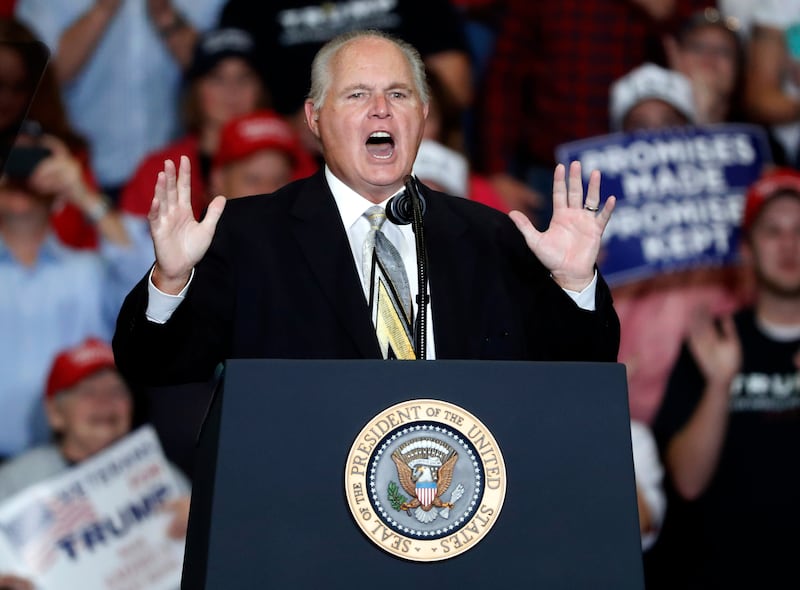Rush Limbaugh can’t be replaced, said all the people trying to replace him after the undisputed king of talk radio died one year ago this week. And on one hand, they were right. Limbaugh was a “once-in-a-generation talent,” renowned radio consultant Fred Jacobs has said.
But someone had to preside over the AM airwaves during Limbaugh’s three-hour slot each day, and Clay Travis and Buck Sexton took over in June to largely positive reviews.
Still, the anniversary of Limbaugh’s death, Feb. 17, showed the difficulty of that task when Travis and Sexton devoted their show to memories of the man they replaced.
Meanwhile, other conservative stars, including Megyn Kelly, Dennis Prager and Dan Bongino, have made inroads in Limbaugh’s space. And his passing might have accelerated the rise of podcasters such as Joe Rogan and Ben Shapiro.
While not a conservative in the mold of Glenn Beck or Mark Levin, it’s Rogan, more than anyone, who has dominated headlines in the talk world in the past year. Compared to Rogan’s big splash on Spotify, Travis and Sexton have been but a ripple, although their syndicator is running ads in Talkers magazine touting the pair’s “explosive growth” in markets like Salt Lake City, Houston and San Diego.
It’s hard to verify their numbers. Ratings for syndicated radio shows are not made public, according to trade publication Inside Radio, which reported last month that Travis and Sexton are doing “just fine.” That’s according to their syndicator, Premiere Networks, which says the show’s audience grew 40% between June and November in the prized demographic of 25- to 54-year-olds.
But it’s not clear how many stations Sexton and Travis are on. Premiere’s website gives numbers for Sean Hannity (“more than 630”) and Glenn Beck (“over 300”), but says only that Travis and Sexton are on “hundreds of radio stations nationwide.” That, and the fact that Premiere sees a need to advertise the show, suggests there’s a lot more room for growth.
After Limbaugh’s death, Premiere gambled on not only a new format (two hosts instead of one) and men without substantial name recognition, but they also gambled on keeping the show closely tied to Limbaugh. The decision to continue with Limbaugh’s longtime theme song and to frequently inject Limbaugh’s voice may have helped longtime listeners still feel connected to the show, but they were also a constant reminder of the man who wasn’t there.
As such, some listeners grieved and moved on — to options that weren’t available when Limbaugh was on the air.
In July, Cumulus Media announced that former Secret Service agent Dan Bongino’s show had been picked up by 300 stations. His tenure there has been rocky, however, with a public spat with another Cumulus host, and the company itself, over vaccine mandates. Now also a Fox News host, Bongino was recently permanently banned from YouTube.
Another option is Dennis Prager’s show, syndicated by the Salem Radio Network, which says Prager is on nearly 400 stations.
And then there’s Megyn Kelly, the former Fox News personality, who occupies two hours of Limbaugh’s former time slot with a show on Sirius XM that is also available as a podcast.
It is the podcast generally that suggests Limbaugh’s once formidable audience is splintered forever. Podcasts, one political scientist told me last year, is where public intellectuals are gathering these days — and talk radio audiences, too, it seems.
Premiere Networks said the Travis and Sexton podcast was downloaded 10.3 million times in December, a record high for the duo. That sounds great, until you look Rogan’s numbers, in excess of 11 million listeners per episode.
It’s unclear what, if any, long-term fallout will be from the recent controversy, in which musicians including Neil Young left Spotify to protest Rogan’s presence there. And Rogan, of course, has a vastly different show from Limbaugh, one that is built around interviews and skews heavily toward young males. Rogan also straddles partisan lines. He is, as Matt Sienkiewicz and Nick Marx recently wrote for The Conversation, “a true outlier in the world of contemporary talk media.”
As was Limbaugh 30 years ago.


 alt=Jennifer Graham
alt=Jennifer Graham